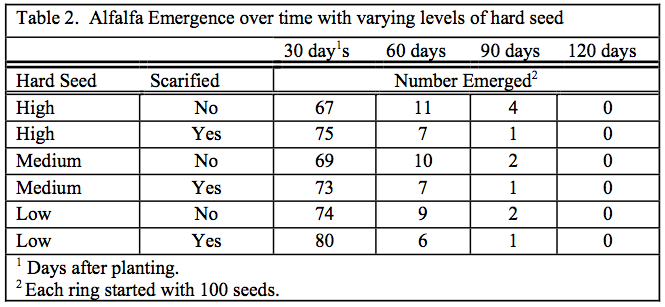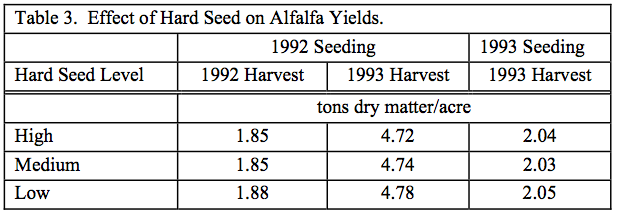By Dan Undersander
Questions that arise about hard seed in alfalfa are becoming more important with increased seed production in the northwestern United States where seed tends to have higher levels of hard seed. To answer questions about hard seed, studies were initiated at three sites (Arlington, WI, West Salem, WI and Napier, IA) in 1992 and 1993 to gain information on the effect of hard seed on speed of germination and on yield during seeding year. Each year four varieties with three levels of hard seed were planted at the three sites. The average hard seed for each of the three levels is shown in table 1. It is interesting to note that the percentage of hard seed declined from fall to spring. The decline of hard seed varied with lot but generally showed greatest declines where initial hard seed levels were highest.

In study one at each site 100 seeds were planted in a ring in the ground and germinated alfalfa seedlings were counted monthly and then removed. Table 2 shows the germination of alfalfa seedlings over time. Data from the three sites were averaged together because there was no difference among the sites. Most of the seed germinated within the first month after seeding with very little germination occurring in later months, regardless of hard seed level. This also tells us that hard seed will not fill in a thin stand because very few seeds germinate after the first month and essentially none after 60 days.

The most important question is: did hard seed levels affect alfalfa yield? In a second study small plots were seeded at 12 lbs seed/a regardless of the level of hard seed. As shown in table 3 below, hard seed had no effect on yield in either the seeding year of the year after.

In summary, up to 40% hard seed had no effect on germination or yield of alfalfa. Further, few seeds germinated after 30 days after seeding and none contributed to yield.
Source:uwex.edu